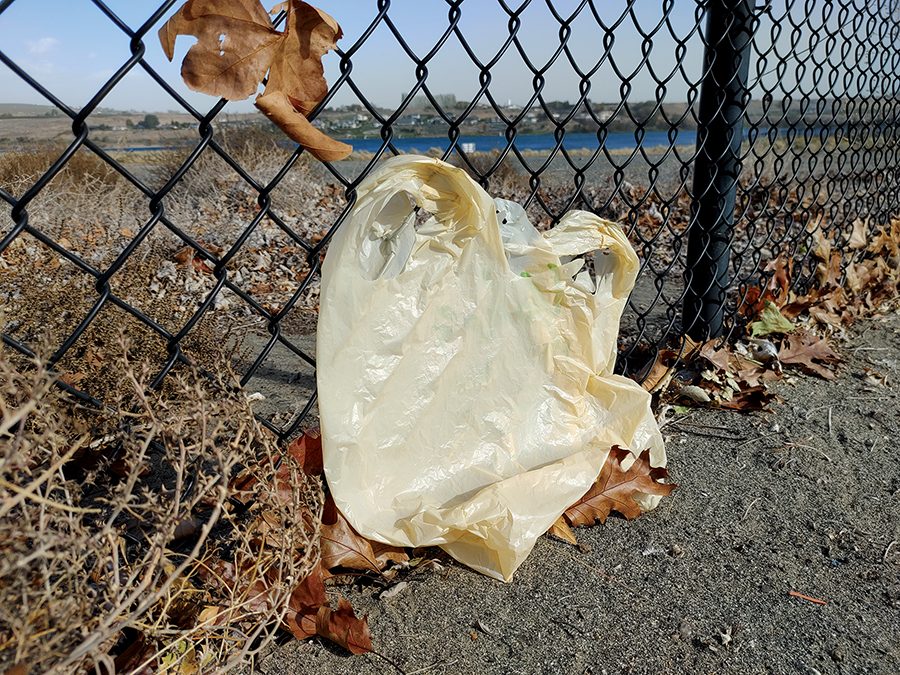
Home » Ban on single-use plastic bags takes effect Jan. 1, unless it doesn’t
Ban on single-use plastic bags takes effect Jan. 1, unless it doesn’t

November 12, 2020
The Covid-19 pandemic and a supply shortage could prevent a ban on single-use plastic bags from taking effect in Washington on Jan. 1.
Gov. Jay Inslee signed a reusable bag bill — a plastic bag ban — into law in March after it passed in both the House and Senate. The state Department of Ecology is set to begin enforcing the new rules in the new year, though there could be pushback over supply chain issues and the Covid-19 pandemic.
The governor’s office confirmed it expects the bill’s supporters to request a delay. That had not happened as of early November.
A delay to July 1 or later is inevitable. Zero Waste Washington, an advocate for reducing plastic bags, reluctantly supports it, said Heather Trim, executive director.
Zero Waste Washington is working with grocery and retail industry associations to figure out the best approach, she said
“The environmental community is not thrilled about this, but we understand and are supportive of delaying implementation,” she said.
The new rules encourage shoppers to use clean, reusable bags, a habit many abandoned when the pandemic hit, and reusable bags were suspected of helping transmit the virus. Research indicates they are not, if they are laundered between uses.
The new rules also replace single-use plastic bags with paper ones made from at least 40% postconsumer recycled content or reusable plastic bags at least 2.5 mil thick. It is part of a larger plan to wean the state from nonrecyclable plastic by 2025.
It applies to restaurants, grocery stores, retail stores, convenience stores, farmers markets, food trucks, temporary stores and home delivery services.
The law adds an 8-cent fee on bags, rising to 12 cents in 2026, when reusable plastic bags must be at least 4 mil thick to encourage reuse. Retailers keep the bag fees.
It replaces 38 individual bag ban ordinances across the state, a welcome shot of consistency for cross state businesses tired of complying with so many sets of rules.
The ban is a “sleeper” issue for retailers, said Mark Johnson, senior vice president of policy and government affairs for the Washington Retail Association.
Its top priority is watching how lawmakers blend budget cuts and new taxes to manage a projected $4.5 billion budget gap in the 2021 Legislature. But the bag ban could create headaches.
There may not be enough bags that meet the postconsumer recycled content requirement to go around.
“There could be a bag shortage,” he said.
Ecology is monitoring the supply issues, said Shannon Jones, materials management coordinator and manager of the plastic bag program.
Jones’ approach is part reassuring, part educational.
Enforcement will be complaint-driven. When it receives a complaint, it will send a letter and steer businesses to resources to help them comply. It has launched a website to guide businesses. Under the rules, businesses have a year to use up their inventory of noncompliant bags.
“We can work with them,” she said. “People don’t need to be worried that they’re going to be immediately levied a $250 fine.”
The statewide ban simplifies compliance for businesses operating in multiple jurisdictions.
It was introduced in the state Senate by Sen. Mona Das, D-Kent. Locally, Reps. Matt Boehnke, R-Kennewick, and Mary Dye, R-Pomeroy, voted to support it.
Zero Waste Washington says Americans consume an average of 500 plastic bags per year, or 2 billion in Washington state alone.
Bags find their way into the environment and are notorious for choking recycling machinery. It cites Ecology statistics that it can cost $1,000 per ton to remove plastic film — bags — from clogged machinery.
There are exemptions.
Compostable bags, which are tinted green or brown, are allowed.
Produce bags, newspaper bags and dry-cleaning bags are exempt.
People who bring their own bags are not charged the bag fee, nor are those who use the State Nutrition Assistance Program (SNAP), Temporary Assistance for Needy Families (TANF), the Women, Infants and Children (WIC) program, or the state Food Assistance Program.
The new rules serve as a reminder that reusable cloth bags are OK for shopping.
Clean reusable bags are as safe as single-use plastic bags and don’t create the pollution problem. The Centers for Disease Control acknowledges reusable shopping bags are acceptable in the pandemic, if allowed by local law and if they are cleaned before each use.
Jones encouraged Washington residents to resume using laundered, reusable bags.
Retailers and other businesses can learn more about the ban and their options under the new law at ecology.wa.gov/Waste-Toxics/Reducing-recycling-waste/Plastic-bag-ban.
Retail
KEYWORDS november 2020




